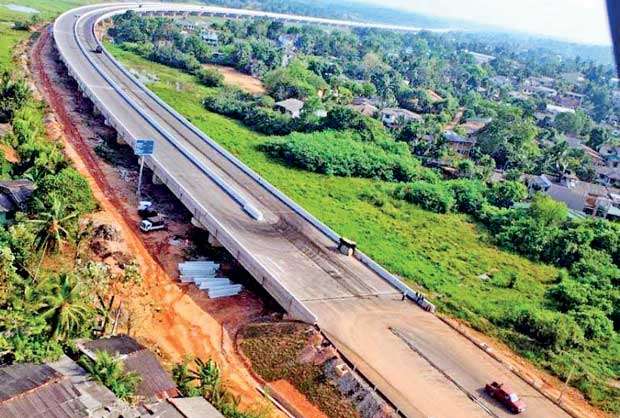What MR got right and this Govt. could not!
Posted on April 24th, 2018
By Ranga Jayasuriya Courtesy The Daily Mirror
Reading the Sunday newspapers, I stumbled upon two stories. One was about ‘resettlement experts’ making a hue and cry that the third phase of Central Expressway would cause mass displacement. From a people’s point of view, we are heading for disaster,” one complains. According to the statistics cited, 6,432 people from 1,742 families would be affected. There are 624 people living in the road corridor; 2,098 agricultural landowners; and 25 entrepreneurs.

The second is a report that the US Congress has allocated US$ 35 million for Sri Lanka for FY 2018, subjective to extensive conditions. Conditions, as the Sunday Times reported, goes as further as, returning military occupied private lands in former conflict zones to their rightful owners, setting up a credible office to investigate the plight of missing persons and publishing the lists of persons who surrendered to the Security Forces after the end of civil war in May 2009.”

The substantial reduction of the presence of the armed forces in former conflict zones and implementing a plan for restructuring and reducing the size of armed forces to adopt a peacetime role that contributes to post-conflict reconciliation and regional security,” are among other conditions
The substantial reduction of the presence of the armed forces in former conflict zones and implementing a plan for restructuring and reducing the size of armed forces to adopt a peacetime role that contributes to post-conflict reconciliation and regional security, are among other conditions
These two stories are in no way interrelated, but they are also microscopic of two contexts which, in our historical experience had a causal effect. There are, of course, two ways to interpret it. The self-righteous one would say that the government’s disregard for the grievances of people such as those evicted by the highway project is a pointer to its overall callousness, which might have warranted such a self –righteous scrutiny by America. The other less politically correct, but more grounded to truth one is that it was this cacophony of endless disagreements over every development project that had held back this country for decades and effectively, this low economic attainment compels it to subject itself to every self-indignation. Also, there is hardly any conclusive evidence that suggest aid extensively tied to human rights and good governance had ever performed better than others, and created growth. In fact, the countries that truly benefitted from the American largess were developmental dictatorships of East Asia, and Chile. They succeeded in part because either Chiang Kai-shek or Pinochet could easily kick out the squatters to build roads, industrial parks and modern cities. Those leaders may not have been globally acclaimed, perhaps with the exception of Lee Kuan Yew, a milder one, and lately Deng Xiaoping. But, at the end of their rule, they all left their countries infinitely better than what they were when they first assumed power.
There is no correlation between economic growth and democracy, and more often than not, an overdose of competing interests and electoral short-termism have made it harder for countries to achieve growth. That is where the leaders come in. They should navigate across those differences to achieve the long term interest of the country and its people. As historical examples have shown, in regime modernization means matters much less than the end. Short term pain could also be in the overall long term interests of democracy as well. Because, though economic growth, and democracy are not inter-related, democracy cannot be sustained in the absence of prosperity.
There is hardly any conclusive evidence that suggest aid extensively tied to human rights and good governance had ever performed better than others, and created growth
Sri Lanka has a sense of urgency to uplift its people. And our habit of arguing over every development project, till the cows come home and project cost hit through the roof has not helped. Political instability and economic inertia at present would make things worse. That is where, to give the devil its due, the previous regime of Mahinda Rajapaksa should be applauded. That is probably the only period in recent history where there were a manifest sense of urgency and tangible outcome of economic modernization on the ground. Sri Lankans want that pro-activeness and political cohesion in the country’s economic development. They could very well vote the Rajapaksas to power in the next election, but that would cause many other problems and probably roll back whatever the democratic gains achieved so far.
To leapfrog economically, poor countries do not necessarily need dictators, even pro-growth ones. But, they have to have strong institutions that are capable of effectively addressing grievances of people who are affected by development work, and also preventing a microscopic minority of public from disrupting the country’s progress. Sometimes, there may not be a foolproof solution to short term pain and physical and psychological displacement that development, free trade and labour reforms are bound to cause. There, the leaders have to look into the matters in a utilitarian perspective, i.e. the greater good for the greatest number of people, even at the expense of a minority.
Ex-President Rajapaksa got that one right. Unfortunately, this government is neither here, nor there.